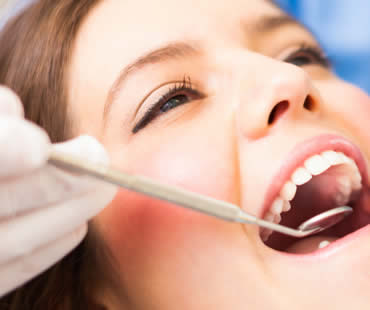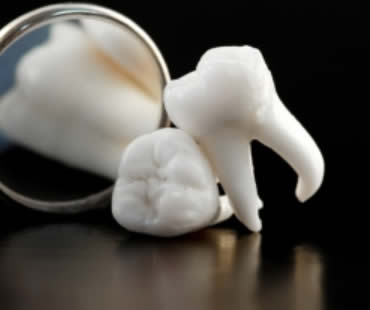
You’re sitting in your dentist’s chair for your checkup, and you hear the dreaded words that you have a cavity. Is it really a cause for panic? Modern advances in equipment and methods may surprise you about what really happens when you get a filling. Let’s learn what to expect if you need this procedure.
The first thing you and your dentist will discuss is the type of filling that is best for you. One choice is an amalgam filling. It is known for its durability, but contains a small amount of mercury which raises concerns among some patients. Another option is a resin composite filling, which is a newer material that contains more plastics. Many patients like this option because its white color is less noticeable in your mouth, but it lasts only about half as long as an amalgam filling.
The first step of the process is numbing the area, unless the cavity is very small and it’s unnecessary. First, the dentist will rub a topical numbing agent on the area, and will give you an injection after it takes effect. Many patients don’t even feel the injection after the topical numbing.
Next, the dentist will separate the area being worked on from the rest of your mouth using a rubber dam or a bite block. Once your mouth is ready, your tooth will be drilled and the decay will be removed.
The actual filling will be placed after the decay is gone. If you are receiving an amalgam filling, the hole will be filled with the metals. It will be pushed down to ensure all of the space is full, and then any overflow will be removed to make the tooth smooth. If you are getting a composite filling instead, the dentist will put some blue acid in the hole to create small holes for bonding the material. The acid is then rinsed, and a bonding agent is applied. Then the composite material will be added. A blue light will be used to harden and strengthen the material. Finally, the filling will be filed to make it smooth.
Dental fillings dentist in Sicklerville

Wisdom teeth are the third set of molars, and usually emerge in the late teens or early twenties. Standard dental practice is to remove wisdom teeth prior to them being fully formed when the roots have not yet had a chance to develop and fully root into the jaw. Younger patients usually have an easier recovery from surgery and many dentists believe early removal prevents future dental problems associated with wisdom teeth.
If your wisdom teeth were not removed as they emerged, there are some signs and symptoms that would indicate the need for extraction including:
- Wisdom teeth that are impacted, which means they have become trapped in the jawbone or gums.
- Wisdom teeth that are emerging at an awkward angle, causing pressure on adjacent teeth.
- Wisdom teeth that do not fit in your mouth, causing crowding of the surrounding teeth as well.
- Wisdom teeth that are suffering from decay or disease caused by the inability to keep them cleaned properly.
- Wisdom teeth that have developed fluid-filled cysts near the gumline.
- Wisdom teeth that are causing pain due to any of the above reasons.
The decision about whether or not to remove your wisdom teeth should be made in consultation with your dental professional. Your dentist or oral surgeon can assess the position and health of your wisdom teeth and make a recommendation for treatment.
If extraction is recommended, they may choose to extract one tooth or all four molars at once. Recovery from the outpatient procedure takes just a few days, and you will quickly be back to normal. Contact our dental office if you are experiencing any of these symptoms listed to determine if you should consider wisdom tooth removal to ensure your future good oral health.

Broken, chipped, stained, or crooked teeth can ruin an otherwise nice smile. Minor flaws like these can be easily corrected with dental veneers. They are a popular way to whiten, straighten, and improve smiles to get long-lasting and natural-looking results. Here are some reasons that veneers are chosen by many people wanting to change their look.
Better smile
Veneers are thin porcelain shells customized to fit securely onto the front surfaces of your teeth. They hide problems and fit in beautifully with the rest of your features. Your smile will be made brand new.
No more stains
Yellow or stained teeth can really make a smile look unattractive. Some discolorations are very hard to get rid of, even with professional cleanings or whitening. Veneers instantly brighten your smile to the shade of your choice, and resist stains so that you no longer have to worry about the foods and drinks you consume.
Straighter teeth
If your teeth alignment problems aren’t major and you don’t want to go to the hassles or expense of braces, veneers may be a solution. They go right over crooked teeth to create a straight smile.
Quick results
Veneers can be provided in just a couple of office visits. You will have a short time between getting temporary and permanent veneers attached, but once they are in you’ll immediately have an improved smile.
Long lasting
Veneers can last a lifetime if you take proper care of them. Regular brushing, flossing, and checkups will help ensure a sparkling smile for many years to come.
Few risks
Side effects with veneers are nearly non-existent. There may be some initial discomfort, but it subsides quickly and can be treated with over-the-counter medications. The only thing to remember is that veneers are permanent. Since a small amount of tooth enamel is removed to accommodate the veneers, you’ll have them forever or will need to get replacements at some point.
Cosmetic dentist in Sicklerville

It’s more common that you might think for adults to lose one or more teeth due to injury or oral diseases. Missing teeth can make chewing and speaking difficult, not to mention lowering a person’s self esteem. That’s why it’s smart to ask your dentist about tooth replacement options, to see if one of them might be right for you.
Dental implants
When artificial tooth roots are inserted into your jaw to replace lost teeth, it’s called dental implants. It involves surgically placing a metal post into the bone under your gums. Then a crown is attached to the post, creating a natural-looking replacement tooth. Dental implants do not affect adjacent teeth, and they look and feel like natural teeth. They are also more secure than other tooth replacement options. However, to be considered for dental implants, you must be healthy overall, have a secure and strong jawbone, and have healthy gums.
Dental bridges
Also called a fixed partial denture, the purpose of a dental bridge is to “bridge” or close the gap between your missing tooth or teeth and your surrounding teeth. Your dentist bonds the bridge onto the teeth adjacent to your gap. This is called a fixed bridge. There are also removable bridges, which you are able to remove, clean, and replace yourself. Another type of dental bridge is called an implant bridge, which attaches to a dental implant. The various types of dental bridge are made from materials like gold, alloys, and porcelain.
Dentures
When you need a tooth replacement option for all or most of your teeth, dentures may be the best choice. Complete dentures are used when you have no teeth left, or the remaining teeth must be removed. These cover both your upper and lower gums. Overdentures are removable and may be used if you have some natural teeth remaining, or have dental implants. These are only an option if your remaining teeth or implants can provide enough support for the overdentures.
Schedule your appointment at our Sicklerville dental office

Though sports drinks and energy drinks may provide refreshment after a workout or keep you awake to study, they can also do serious damage to your teeth. People often think of these drinks as healthy alternatives to soda, but that’s not the case. In fact, research shows that these beverages are up to 10 times worse for your oral health than cola.
The issue with sports and energy beverages comes from the high acidity. Manufacturers add acid to these drinks to balance the sugar. Even more than soft drinks, the acid in sports and energy beverages can erode tooth enamel, which increases the odds of cavities. Once teeth are weakened by decay, you become more susceptible to future problems down the road.
Another reason sports and energy drinks are problematic is the way people consume them. Because most individuals sip on them throughout the day, teeth are continuously exposed to the acid in the beverages. To minimize the risks to your oral health, consider these tips:
- Use a straw when you consume these beverages because it restricts the amount of liquid that gets on your teeth.
- Chew sugar-free gum, which promotes saliva production and rinses the acid from your teeth.
- Brush your teeth right after drinking sugary beverages to remove any residue and keep teeth healthy.
- Make H2O your first choice. Consuming lots of water and limiting intake of sodas, sports beverages, or energy drinks will help you stay hydrated and promote good oral health.
Family and general dentist in Sicklerville

Lots of people feel self-conscious about smiling, and problems with their teeth can make them hesitant to talk and laugh with others. Veneers are an easy way to transform teeth, and to get that gorgeous smile you’ve always wanted. Dental veneers are made from very thin pieces of porcelain or composite resin and fit tightly over the front surfaces of your teeth. They can mask many different types of imperfections and are a great way to improve the appearance of your smile.
In spite of this, veneers are not suitable for everyone. Your cosmetic dentist in Sicklerville can help you decide if veneers are the best choice of treatment, or if another solution might be more appropriate. This procedure is not usually reversible so it’s important to be sure before your teeth are prepared for veneers. The following guidelines will help you determine if dental veneers are right for you.
Tooth Decay
Teeth that are decayed or which have already been filled are weaker and less able to support veneers. In this case you may be better off considering dental crowns that completely cover up decayed teeth right down to the gum line.
Gum Disease
You will need to have a full checkup with your dentist in Sicklerville prior to having veneers. If you have any signs of gum disease then this condition must be treated first. It’s important to be in good oral health before your veneers are fitted.
Bad Oral Habits
Nail-biting, biting on ice cubes and teeth grinding can all damage veneers. If you have any of these habits then you’ll need to quit if you want your restorations to last.
Misaligned Teeth
If your teeth are quite crooked or misaligned, consider consulting an orthodontist to decide if braces are a better solution. It could be that once your teeth are straightened you’ll no longer need veneers. Dental veneers are not meant to correct severely misaligned or crooked teeth.












